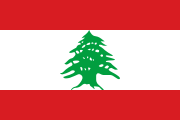Portal:Lebanon/Intro

Lebanon (/ˈlɛbənɒn, -nən/ ⓘ LEB-ə-non, -nən; Arabic: لُبْنَان, romanized: Lubnān, local pronunciation: [lɪbˈneːn]), officially the Republic of Lebanon, is a country in the Levant region of West Asia. It is bordered by Syria to the north and east, by Israel to the south, and by the Mediterranean Sea to the west; Cyprus lies a short distance away from the country's coastline. Lebanon's location at the crossroads of the Mediterranean Basin and the Arabian hinterlands has contributed to the country's rich history and shaped a unique cultural identity shaped by religious diversity. Lebanon has a population of more than five million people and covers an area of 10,452 square kilometres (4,036 sq mi). Lebanon's capital and largest city is Beirut, followed by Tripoli and Jounieh. While Arabic is the official language, French is also recognized in a formal capacity; Lebanese Arabic is the country's vernacular, though French and English play a relatively significant role in everyday life, with Modern Standard Arabic being limited to news and government matters.
The earliest evidence of human civilization in Lebanon dates back to 5000 BCE. From 3200 to 539 BC, what was to become Lebanon was part of Phoenicia, a maritime empire that stretched the Mediterranean Basin. In 64 BC, the Roman Empire conquered the region, and Lebanon soon became a major center for Christianity under the aegis of the Byzantine Empire. In the 7th century, the Muslim conquest of the Levant brought the region under the control of the Rashidun Caliphate. The 11th century saw the beginning of the Crusades and the establishment of Crusader states, which later fell to the Ayyubids and the Mamluks, who in turn ceded the territory to the Ottoman Turks in the aftermath of the Ottoman–Mamluk War of 1516–1517. Under Ottoman ruler Abdulmejid I, the first Lebanese proto-state was established in the form of the Mount Lebanon Mutasarrifate, created in the 19th century as a home for Maronite Christians under the Ottoman "Tanzimat" period.
Lebanon is a developing country, ranked 112th on the Human Development Index. It has been classified as an upper-middle-income state. The Lebanese liquidity crisis, coupled with nationwide corruption and recent disasters such as the 2020 Beirut explosion, have precipitated the collapse of Lebanon's currency and fomented political instability, widespread resource shortages, and high unemployment and poverty. The World Bank has defined Lebanon's economic crisis as one of the world's worst since the 19th century. Despite the country's small size, Lebanese culture is renowned both in the Arab world and globally, powered primarily by the Lebanese diaspora. Lebanon is a founding member of the United Nations and of the Arab League, and is a member of the Non-Aligned Movement, the Organization of Islamic Cooperation, the Organisation internationale de la Francophonie, and the Group of 77, among others. (Full article...)
